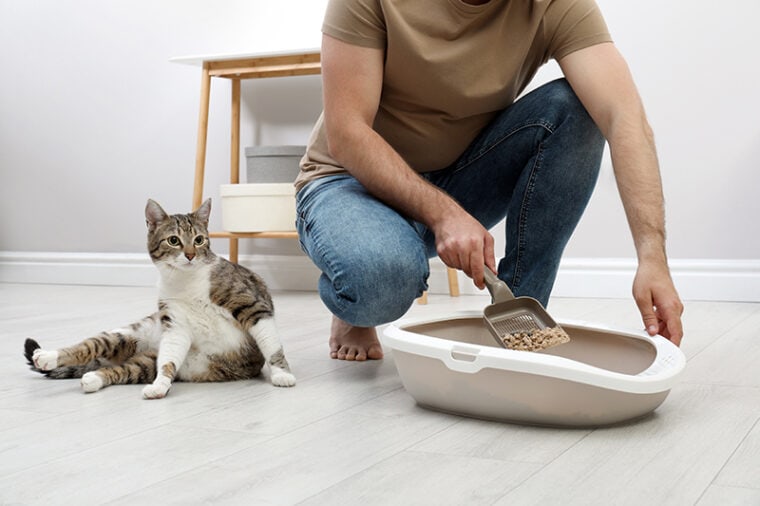
A litter box is an important and integral part of a cat’s daily life. However, a cat won’t be happy using a litter box that’s not clean, and we can’t blame them! Dirty litter boxes can pose health risks to your cat and your family, make your cat very unhappy, and even stress them out. Not to mention they stink! This article explains why keeping your cat’s litter box clean is essential, how often they need cleaning, and which litter boxes are best.
The 8 Reasons Why Cleaning Your Cat’s Litter Box is Important
1. Regular Cleaning Can Help Prevent Feline Cystitis
Cats are fastidious cleaners and get upset and stressed when their environments aren’t clean. This is particularly true for their litter boxes. While a dirty litter box can cause stress and various illnesses, feline cystitis is a potential consequence of a dirty litter box.1
Cats can suffer from cystitis caused by a dirty litter box due to the stress, and it causes painful urination, straining to urinate, and blood in the urine. Cats that cannot urinate are a medical emergency as they can quickly experience acute kidney failure. A clean litter box can prevent one of the primary causes of feline cystitis and keep your cat happy.
2. Cleaning the Litter Box Gets Rid of Odors
This goes without saying, but the smell of a dirty litter tray is repulsive. A cat’s sense of smell is 14 times better than a human’s, and they must smell their pee and poop at a close range when they enter their litter box. The smell of cat urine is powerful and will permeate your home if you don’t clean the box enough.
The pungent smell of cat pee is caused by ammonia, the concentration of urine, and pheromones, which can be very difficult to eliminate. Keeping the litter box clean keeps your home fresh and your cat comfortable.
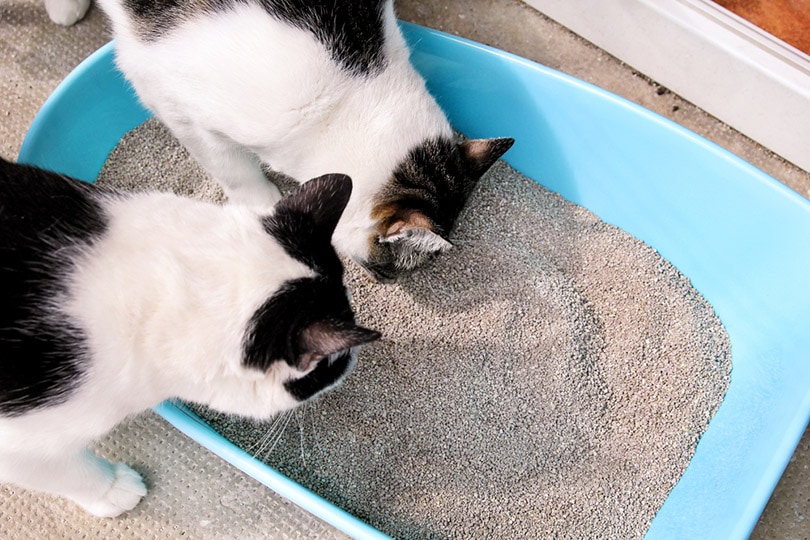
3. Reduction of Ammonia
Ammonia is a product of the decomposition of urine, which can harm you and your cat if it’s allowed to build up. Ammonia can cause respiratory problems in people and felines, including pneumonia in severe cases, and it can trigger attacks in cats suffering from asthma.
In humans, ammonia can cause headaches, nausea, and coughing. By thoroughly cleaning your cat’s litter box, including wiping and disinfecting the tray before replacing the litter, you can prevent ammonia build-up and keep your cat safe.
4. Cleaning Prevents Bacterial Build Up
Regular cleaning of the litter box will stop bacteria from building up inside it. Bacteria will breed and multiply very quickly in a dirty litter box. A possible cause of FLUTD (Feline Lower Urinary Tract Disease) in older cats is bacteria from feces traveling up the urethra.2 This can cause bladder and kidney infections, which in some serious cases may be life-threatening.
Because cats often dig in their litter boxes to cover the waste, they can inadvertently spread bacteria around the box. This spread makes it more likely for an infection to be picked up this way, so cleaning the litter box thoroughly (including the walls ) can help prevent the build-up of potentially harmful bacteria.
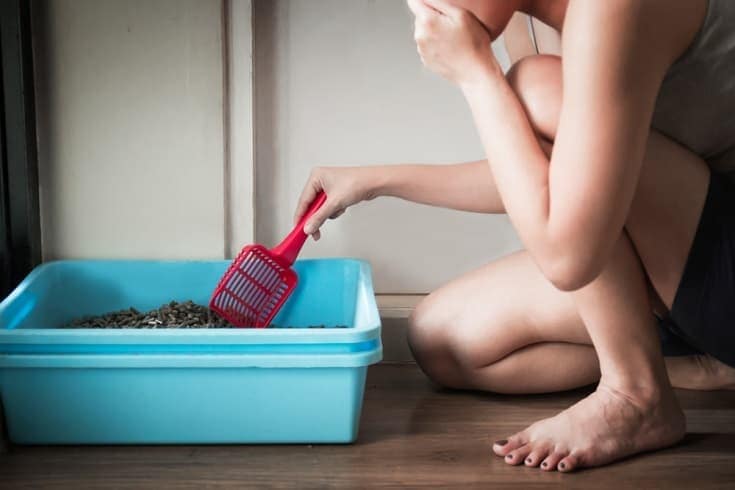
5. A Clean Litter Box Reduces Stress
Because cats are very clean creatures, they get stressed in dirty surroundings. This is particularly true for their litter box, as a cat in the wild would usually completely bury their poop to mask the smell.
This stress can cause health problems in cats, and if cats hold their pee, it can cause inflammation and the build-up of proteins and crystals in the bladder. Bladder stones can cause pain, problems urinating, and blockages of the urethra.
6. Regular Cleaning Encourages Use
Cats that don’t have a clean place to use the bathroom won’t use it! A cat that has to choose whether to pee and poop in a dirty litter box or a nice clean pile of clothes will likely choose the clothes. If a litter box is kept clean and fresh, your cat will appreciate it and view it as the perfect place to potty.
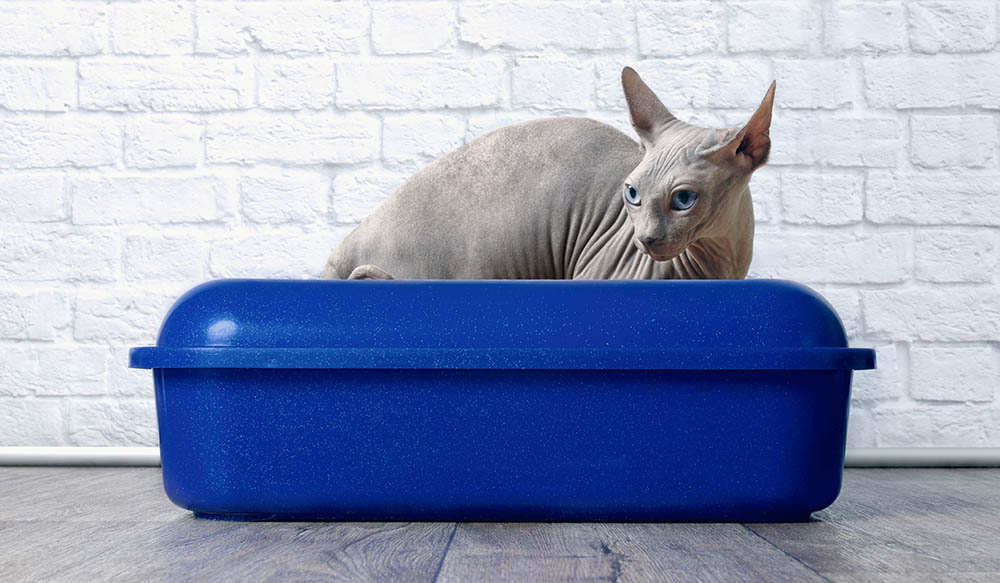
7. A Dirty Litter Box Poses a Health Risk to Humans
Some parasites and bacteria can be spread from a dirty litter box, including Toxoplasma gondii, salmonella, and campylobacter. Toxoplasma is a parasite that causes an infection, which is particularly dangerous for certain people, such as young people or the elderly. Toxoplasmosis can cause birth defects and miscarriages in pregnant women. Salmonella and campylobacter are nasty bacteria that can breed in dirty litter boxes. These bacteria can cause gastrointestinal inflammation, vomiting, diarrhea, and dehydration, which can be dangerous to children.
8. Clean Litter Boxes Reduce Fur Clumping and Skin Problems
Lastly, a dirty litter box can cause sores and skin irritation if urine is allowed to build up, and clumping cat litter sodden with pee can get tangled in your cat’s fur or get stuck between their pads. This doesn’t happen all the time, but clumping cat litter makes uncomfortable matting much more common if the litter box is left dirty. If your cat has any pre-existing injuries, a clean litter box reduces the risk of getting infected.
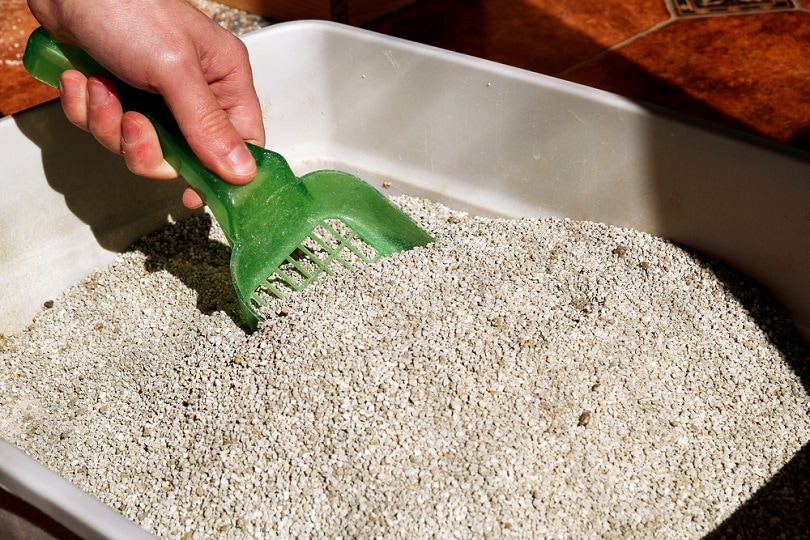
How Often Should I Clean My Cat’s Litter Box?
As a rule of thumb, cats’ litter boxes should be scooped at least daily and cleaned out completely every week. This weekly scrubbing includes cleaning the sides and bottom of the box, which owners should regularly disinfect. By spot cleaning daily, you can keep your cat’s tray fresh and free of soiled litter, which will reduce odors and keep your cat happy.
No matter how hard you try, pets will always leave you cleaning up smells, stains, vomit, hair, and everything in between. With the Hepper Advanced Bio-Enzyme Pet Stain & Odor Eliminator Spray, you can advance your clean-up routine!
- ADVANCED ENZYMATIC CLEANER - Penetrates the most stubborn smells and stains at the deepest molecular...
- FOR ANY MESS, ON ANY SURFACE - This pet odor eliminator cleans your carpets, floors, furniture,...
- FRESH, NATURAL ODOR - Our unique formulation doesn't rely on dangerous or unpleasant chemical...
It permanently removes the very worst pet stains and smells (and truly makes clean-up a breeze). Click here to learn more, order a bottle, and freshen up your home today.
At Pet Keen, we’ve admired Hepper for many years, and decided to take a controlling ownership interest so that we could benefit from the outstanding products of this cool cat company!
Which Litter Box Is Best for My Cat?
Thinking about your cat’s needs when selecting a litter tray is important, as health conditions or privacy preferences will make a difference in which litter box they prefer. For example, some cats like enclosed or hooded litter boxes, while others may have to use a low-sided tray as they have painful joints. You might have to try a couple of boxes throughout your cat’s life, but always remember to take them to the vet if you notice any changes in litter box habits.
It is recommended that you have one litter tray per cat in the household and one extra. They should be positioned in a quiet, low-traffic area of the house. It is also important to place them away from food and water bowls.
Conclusion
A clean litter box is vital to your cat’s health and happiness. Leaving your cat’s litter box dirty can not only risk their physical health due to the possibility of bacterial infections and respiratory irritation, but their mental health can also suffer. Cats that have no choice but to use a dirty litter box can get very stressed, which can, in turn, cause more health problems such as cystitis or bladder stones. Scooping your cat’s litter box daily and thoroughly cleaning it out once a week is the minimum needed to keep it fresh.
Featured Photo Credit: New Africa, Shutterstock









